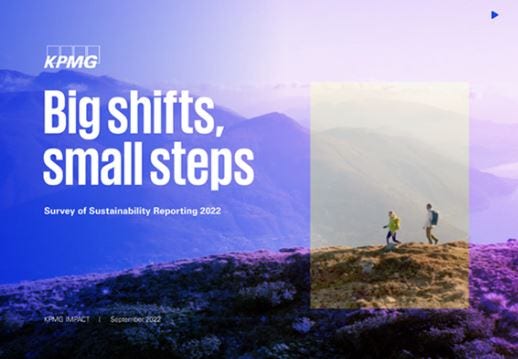2022 is a pivotal year for nature and biodiversity with international efforts stepping up to halt biodiversity loss. Despite growing awareness of biodiversity loss as a critical issue, only 40 percent of the N100 and 46 percent of the G250 recognize the loss of biodiversity or nature as a risk to their business.
The introduction of new standards, such as the Taskforce on Nature-related Financial Disclosures (TNFD) and the Corporate Sustainability Reporting Directive (CSRD), are likely to drive improvements in disclosure.
Latin America continues its regional leadership in biodiversity reporting
Latin America includes some of the most biodiverse areas on the planet but is suffering from massive biodiversity loss due to mining, land use changes, and deforestation. Currently, half of companies in the N100 in the region report on biodiversity risks.
In Europe, just over one-third (39 percent) of N100 companies are reporting, while the North America rate is at 45 percent. The top four N100 reporters are the UK (77 percent), Thailand (68 percent) and Japan (64 percent).
Biodiversity is a focus for most sectors, even ones considered lower risk
Most sectors, even low risk ones, acknowledge biodiversity as a risk to their business. In 2020, companies from the extractive industries were more inclined to report the loss of biodiversity. In 2022, there has been notable growth across a broader range of sectors, particularly in the TMT and automotive sectors.
Key global trends in sustainability reporting
Sustainability reporting grows incrementally with movement towards the use of standards framed by stakeholder materiality assessments
An impressive 96% of the world’s leading 250 companies report on sustainability, a rate likely to increase as new regulations on non-financial reporting is introduced. Usage of global standards like GRI, SASB, and stock exchange guidelines have also increased, with the GRI the most dominant. A significant majority of reporting companies across both the N100 and G250 disclose their materiality.
Reporting on climate risk and carbon reduction
Increased reporting on climate-related risks and carbon reduction targets, in line with TCFD
Climate reporting is the most common form of disclosure ahead of social impact and governance risk. Nearly three-quarters of companies report their carbon targets and the number of companies reporting against TCFD has nearly doubled, leading to more consistent and comparable climate disclosure.
Reporting the risk from biodiversity loss
Growing awareness of biodiversity risk
2022 is a pivotal year for nature and biodiversity with international efforts stepping up to halt biodiversity loss. Despite growing awareness of biodiversity loss as a critical issue, less than half of companies recognize this loss as a risk to the business. On the positive side, most sectors now acknowledge this risk, even many of those that can be considered low risk. The launch of the Taskforce on Nature-Related Financial Disclosure (TNFD) and Corporate Sustainability Reporting Directive (CSRD) frameworks are expected to drive up reporting across countries and sectors in the immediate years.
Reporting on the UN Sustainable Development Goals (SDGs)
UN SDG reporting prioritizes quantity over quality
The majority of companies report on SDGs, with 10 percent of companies reporting against all 17 SDGs. Three SDGs remain the most popular for companies: 8. Decent Work and Economic Growth; 12. Responsible Consumption and Production; and 13. Climate Action.
Companies increasingly acknowledging ESG issues as risk areas
Climate risk reporting leads, followed by social and governance risks
An increasing proportion of companies acknowledge that climate change is a business risk. However, less than half of companies report on social and governance risks to their business. In general, the description of these risks are overwhelmingly narrative-driven and do not quantify the financial impact on these risks on companies or on society.
Sustainability continues to become a priority for company leadership but there is room for improvement. Only one third of companies in the N100 have a dedicated member of their board or leadership team responsible for sustainability matters. Compensation conditions related to sustainability outcomes for leadership teams are prevalent for only 40 percent of G250 companies.
Survey of Sustainability Reporting

Our people

Jennifer Shulman
Lead Partner Economic Services in Canada, Global Lead ESG Advisory Hub
KPMG International




